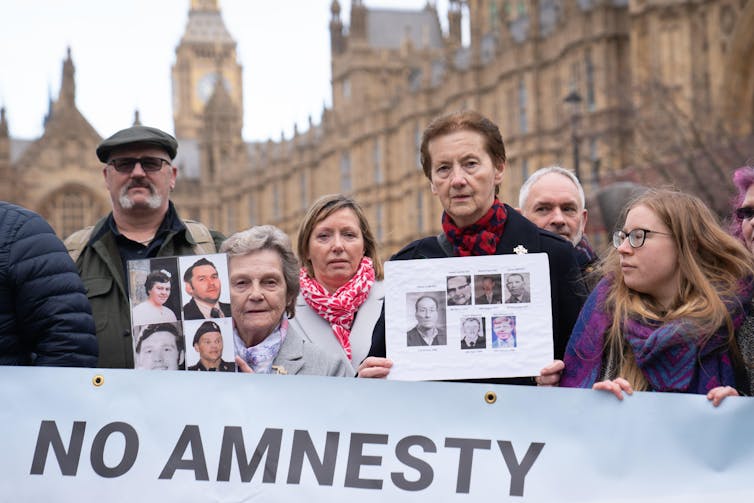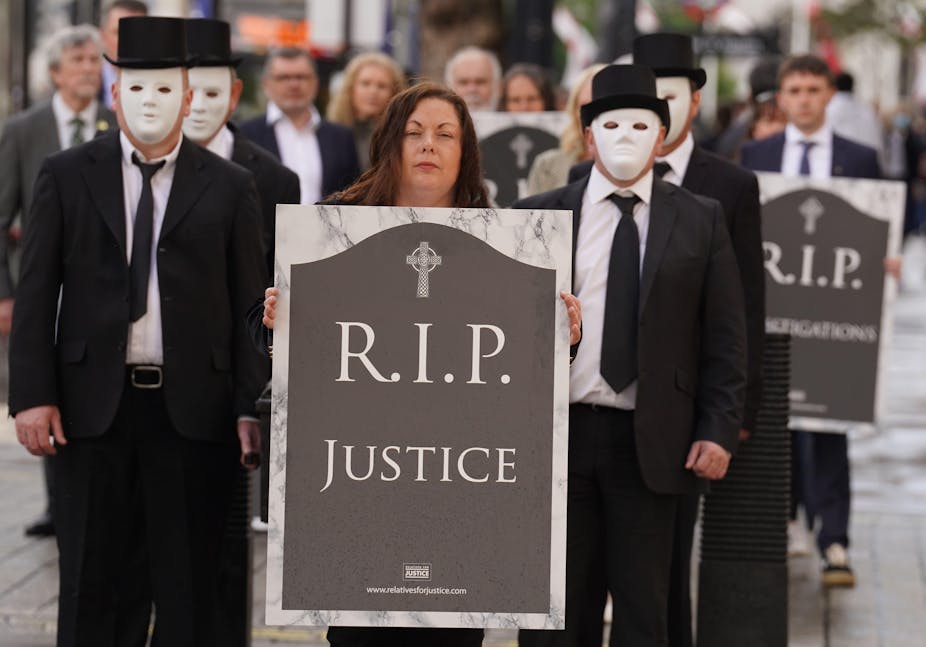The UK government’s Northern Ireland Troubles (legacy and reconciliation) bill – which has faced near universal opposition in Northern Ireland – has passed the House of Commons. The Commons rejected the latest Lords’ amendments, paving the way for the controversial bill to receive royal assent and become law in the coming weeks.
More than 1,000 killings relating to the 30-year armed conflict in Northern Ireland, known as the Troubles, are still being investigated. This bill will close down all methods of investigating Troubles-related offences, including criminal investigations, coroners’ inquests, police ombudsman investigations and civil remedies.
In their place, an independent commission will review (rather than fully investigate) Troubles-related deaths and very serious injuries and provide reports to families.
Former soldiers and paramilitaries will be granted amnesty on the condition that they disclose their involvement in serious offences “to the best of their knowledge and belief”. In other words, perpetrators of historic violence will be protected from prosecution if they cooperate with the commission.
Families of victims have repeatedly expressed their opposition to these measures, which they see as protecting perpetrators at the expense of the victims. The Troubles, which ended with the 1998 Good Friday Agreement, saw more than 3,500 people killed, mostly by paramilitary groups and armed forces, including the British Army.
The UK government has claimed that there have been “vexatious claims” and a “cycle of reinvestigations” against former British soldiers, and that the legacy bill is needed to protect veterans.
The bill has faced strong condemnation from the Irish government, the UN, the Council of Europe and the US Congress. These groups have argued that the bill will violate the UK’s obligations under the 1998 Good Friday Agreement, as well as international human rights law.
The bill also calls on the UK government to appoint people to lead a number of efforts to commemorate the Troubles. These include collecting oral histories from members of the public, conducting academic research and other projects to “promote memorialisation”.
In other post-conflict societies, such measures have been valuable steps towards reconciliation, as they can contribute to more inclusive narratives of the conflict and provide a forum to acknowledge victims’ experiences.
However, the strength of opposition to the legacy bill will inevitably undermine these efforts in Northern Ireland, because families of victims feel their intergenerational trauma will remain unresolved.
A controversial bill
In Northern Ireland, victims and survivor groups have consistently opposed the bill, which they view as a denial of victims’ rights to truth. They have been supported by civil society groups, churches and the Northern Ireland Human Rights Commission.

Notably, all five of Northern Ireland’s main political parties have called on the UK government to scrap the legislation – an unusual display of consensus. The Democratic Unionist Party called the bill an “insult” to the memory of victims.
The cross-community opposition to the bill is also striking given academic research and public debate on the enduring challenges Northern Ireland has faced in its journey to reconciliation.
In the rest of the UK, the Labour party and SNP have repeatedly voted against the legislation. The Scottish Parliament has voted to withhold legislative consent. In one of his first comments as shadow Northern Ireland secretary, Hilary Benn said a future Labour government would repeal the law. Public opinion data also shows that most British people oppose the legislation.
Northern Ireland politics
This bill comes at a challenging time in Northern Irish politics. The power-sharing institutions, established by the Good Friday Agreement, have been suspended since 2022. This current impasse follows a three-year collapse in 2017-20.
The reasons for these failures are complex and many. However, they reflect how the peace process has stalled – political shocks such as Brexit have heightened political divides and caused instability.
The bill is unlikely to meet its stated goal of “reconciliation”. By contravening the terms and spirit of the Good Friday Agreement, this bill risks further unravelling the delicate balancing act that supported Northern Irish political life. It will also strain the relationship between the British and Irish governments, already damaged by Brexit.
What happens next?
When the bill becomes law, it will be swiftly met by legal challenges in the Northern Irish courts. These challenges will test whether the bill complies with the government’s human rights obligations. If it is found not to, the government will be under pressure to reform the proposals before any independent reviews can begin.
The Irish government is planning to seek legal advice about bringing an interstate challenge against the UK at the European court of human rights. The only other time this has happened was 52 years ago, during the Troubles. Ireland challenged the UK over its use of interrogation methods known as “the five techniques” on 14 men who were detained without trial by British security forces during the early years of the conflict.
An adverse ruling by the Strasbourg court would be a highly public repudiation of the UK’s failure to meet its human rights obligations.
With the next UK general election due by January 2025, it is possible the legacy bill could be repealed before the commission can begin work. This would allow police and judicial investigations to be reopened. But while this would be a welcome prospect for many, it would mean even more uncertainty and delays in the long-overdue efforts to reconcile with the past.

